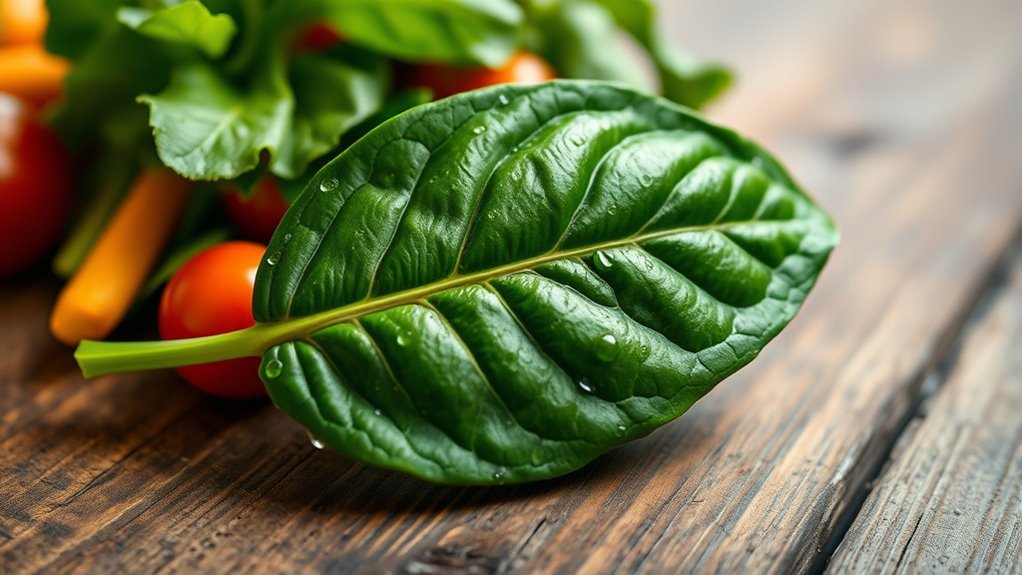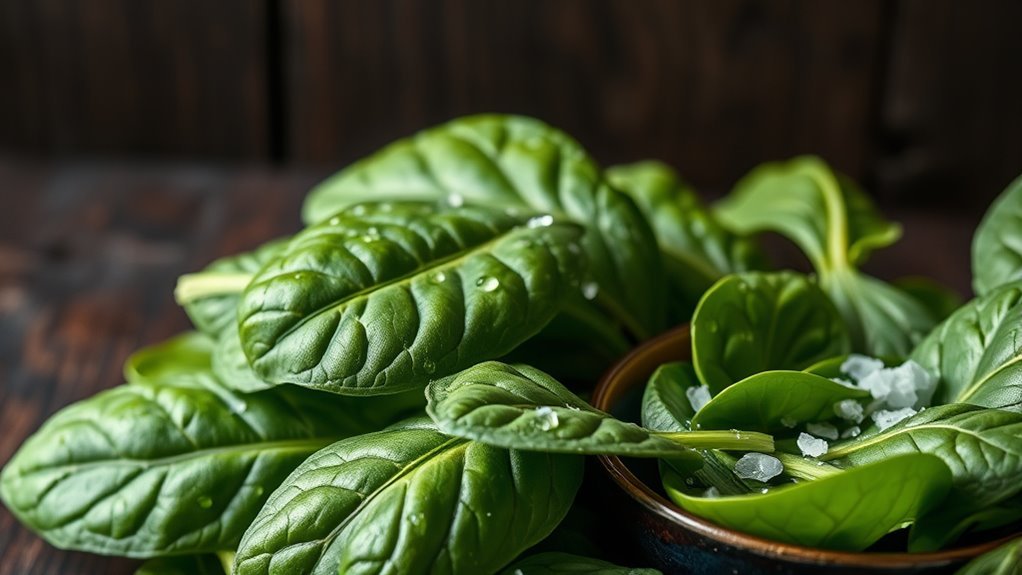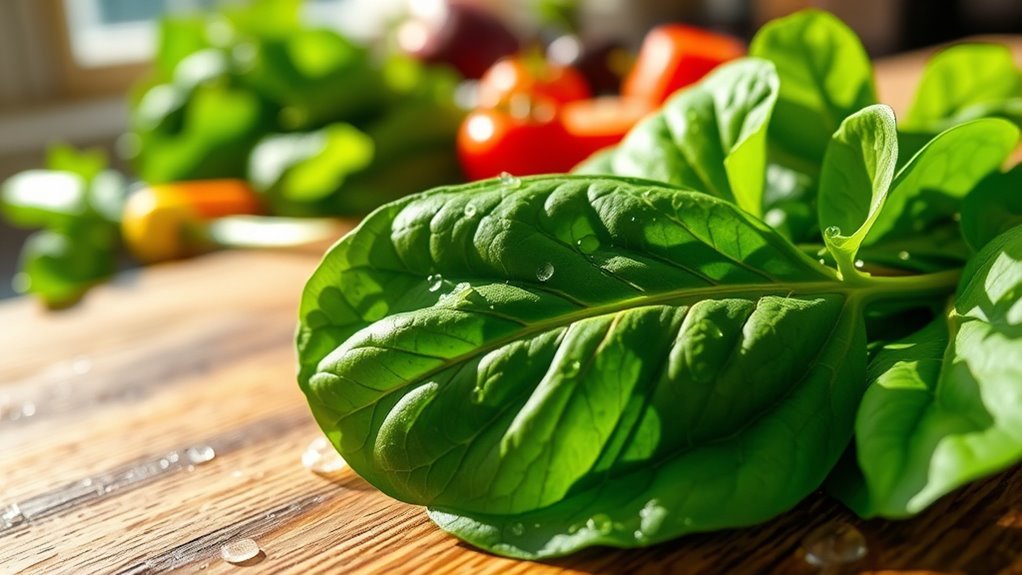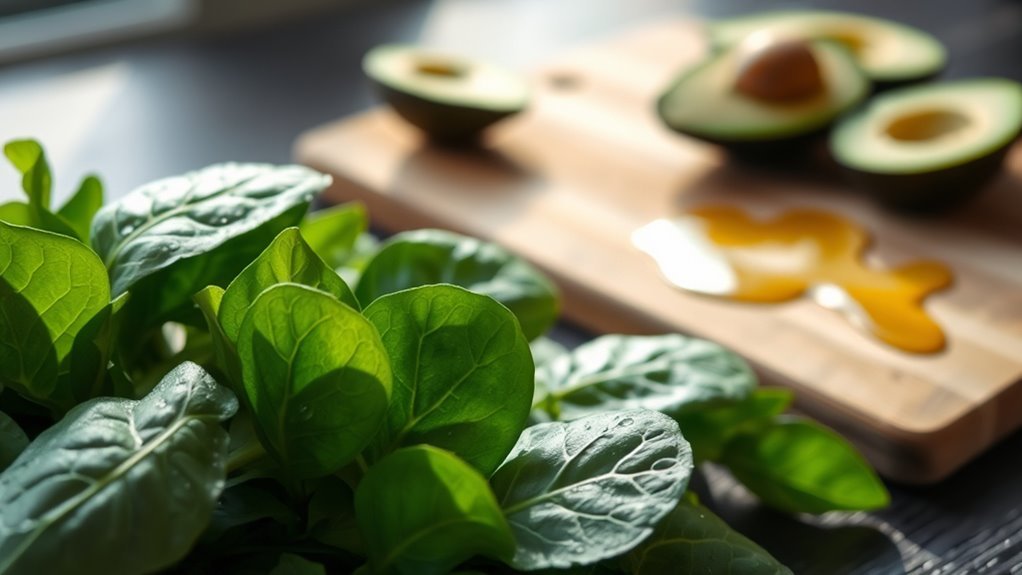Yes, spinach is a great vegetable for the keto diet. It contains only about 1 gram of net carbs per cup, making it perfect for maintaining ketosis. Rich in vitamins A, C, and K, it also offers numerous health benefits, such as supporting immune function and promoting healthy bones. You can easily incorporate spinach into various keto meals, adding nutritional value without raising carb intake. If you’re curious about more ways to use spinach on keto, there’s plenty to explore.
Understanding the Keto Diet

When you explore the keto diet, it’s vital to understand its core principles, as this low-carb, high-fat eating plan aims to shift your body into a state of ketosis. The keto basics center on drastically reducing carbohydrate intake, which typically includes avoiding sugars and starchy foods. Instead, you’ll focus on healthy fats and moderate protein sources. This shift can lead to increased fat burning and potential weight loss, offering a sense of freedom from traditional dietary restrictions. However, it’s essential to approach the diet mindfully, as not all fats are created equal. Balancing your nutrient intake and staying informed about food choices will help you navigate the keto journey effectively, maximizing benefits while minimizing pitfalls.
Nutritional Profile of Spinach

Spinach, often celebrated for its impressive nutritional profile, packs a punch of vitamins and minerals while remaining low in carbohydrates. This leafy green is rich in vitamins A, C, and K, as well as essential minerals like iron and magnesium. Depending on the spinach varieties you choose, you’ll find different benefits; for instance, baby spinach is tender and great for salads, while mature spinach has a more robust flavor, ideal for cooking. Incorporating spinach into your meals can be easy and versatile—try tossing it into smoothies, salads, or stir-fries. With countless spinach recipes available, you can enjoy this nutrient-dense vegetable while adhering to your dietary preferences, feeling empowered in your food choices.
Carbohydrate Content in Spinach

When considering spinach for a keto diet, it’s important to understand its carbohydrate content. A typical serving of spinach contains about 1 gram of net carbs, making it a suitable choice for those watching their carb intake. By calculating net carbs, which subtract fiber from total carbs, you can easily see how spinach fits into your meal plan.
Spinach Nutritional Profile
A closer look at spinach reveals it to be a low-carb powerhouse ideal for those following a ketogenic diet. With only about 1 gram of net carbs per cup of raw spinach, it’s easy to see why you’d want to include this leafy green in your meals. There are several spinach varieties, like baby spinach and savoy spinach, each offering unique textures and flavors for diverse spinach preparation methods. Whether you’re sautéing, blending it into smoothies, or tossing it in salads, spinach can add nutritional value without compromising your carb limits. Additionally, it’s rich in vitamins and minerals, enhancing your overall health while keeping you on track with your keto lifestyle. Enjoy the freedom spinach brings to your plate!
Net Carbs Calculation
While many leafy greens are low in carbs, spinach stands out due to its remarkably low net carb count. Typically, one cup of raw spinach contains only about 1 gram of net carbs, making it an excellent choice for those following a keto diet. Different spinach varieties, such as baby spinach and flat-leaf spinach, maintain similar low carb profiles, allowing you to enjoy a variety of textures and flavors without exceeding your carb limits. Plus, with its high fiber content, spinach can help you feel full while keeping your net carb intake in check. Including spinach in your meals not only supports your keto lifestyle but also provides essential nutrients that contribute to overall health.
Health Benefits of Spinach
Spinach is packed with essential nutrients, making it a highly nutrient-dense food that can support your overall health. Its rich antioxidant properties help combat oxidative stress and may reduce the risk of chronic diseases. Including spinach in your diet not only boosts your vitamin and mineral intake but also enhances your body’s natural defense systems.
Nutrient Density Overview
Packed with essential vitamins and minerals, spinach stands out as a nutrient-dense superfood that offers numerous health benefits. With various spinach varieties, such as savoy and flat-leaf, you can enjoy different textures and flavors while reaping the rewards. Spinach is rich in vitamins A, C, and K, along with minerals like iron and magnesium, all vital for maintaining ideal health. Significantly, these nutrients enhance nutrient absorption, helping your body utilize what it consumes more effectively. Incorporating spinach into your diet can support immune function, promote healthy bones, and even improve skin health. Embracing this leafy green not only adds variety to your meals but also empowers you to make nutritious choices that align with your lifestyle goals.
Antioxidant Properties Explained
The impressive nutrient profile of spinach includes a variety of antioxidants that contribute to its health benefits. These spinach compounds, such as vitamins A, C, and E, along with flavonoids and carotenoids, work together to provide significant antioxidant benefits. They help neutralize free radicals in your body, which can reduce oxidative stress and lower the risk of chronic diseases. By incorporating spinach into your diet, you’re not just enjoying a low-carb option; you’re also boosting your body’s defense against inflammation and cellular damage. Plus, the fiber in spinach can enhance your gut health, making it a great addition to a keto diet. So, enjoy spinach for its taste and its powerful protective properties!
How to Incorporate Spinach Into Keto Meals
When you’re looking to enhance your keto meals, incorporating spinach can be a game-changer due to its low carbohydrate content and rich nutrient profile. You can easily add spinach to your diet by blending it into spinach smoothies for a revitalizing breakfast or snack. Just mix it with some avocado and unsweetened almond milk for a creamy texture without the carbs.
Alternatively, try creating spinach salads tossed with healthy fats like olive oil or avocado for a satisfying side. You can also sauté spinach with garlic and butter as a simple yet delicious side dish. With these options, you’ll enjoy the benefits of spinach while sticking to your keto lifestyle, keeping your meals both nutritious and flavorful.
Spinach vs. Other Leafy Greens on Keto
While spinach stands out for its low carb content and nutrient density, it’s important to compare it with other leafy greens often included in a keto diet. Spinach varieties like baby spinach and savoy spinach offer unique textures and flavors, but you might also consider kale, Swiss chard, and arugula. Kale is rich in vitamins A, C, and K, while Swiss chard provides magnesium and fiber, making them great keto options too. Arugula, on the other hand, boasts a peppery taste and is low in carbs. Each leafy green has its own benefits, so diversifying your choices can enhance your nutrient intake while keeping your carb count low. Ultimately, find what you enjoy to keep your keto journey fulfilling.
Common Myths About Spinach and Keto
What misconceptions might you have about spinach and its role in a keto diet? Many people think spinach is too high in carbs, but that’s a common myth. In reality, it’s low in net carbs, making it a fantastic choice for keto flexibility. Another misconception is that spinach lacks essential nutrients. On the contrary, it’s packed with vitamins A, C, and K, as well as minerals like iron and calcium. You might also believe that you can’t enjoy spinach in various dishes, but its versatility allows you to incorporate it into salads, smoothies, and sautés. By understanding these spinach misconceptions, you can make informed choices that align with your keto lifestyle while enjoying the freedom of diverse cuisine.
Tips for Buying and Storing Spinach
To guarantee you get the freshest and most nutritious spinach for your keto diet, it’s important to pay attention to a few key factors when buying and storing it. Look for fresh spinach with vibrant green leaves, avoiding any that appear wilted or discolored. If you prefer frozen spinach, choose organic options when possible, as they often retain more nutrients. Baby spinach is another great choice; it’s tender and versatile for various spinach preparations. For ideal spinach storage, keep it in a breathable container in the fridge to maintain its freshness. Remember to consume fresh spinach within a week, while frozen spinach can last several months. Exploring different spinach varieties can also enhance your meals and nutritional intake!
Frequently Asked Questions about Spinach and Keto
Is spinach keto-friendly?
Yes, spinach is considered keto-friendly. It is low in carbohydrates and high in fiber, making it an excellent choice for those following a ketogenic diet. A 100-gram serving of raw spinach contains only about 3.6 grams of carbohydrates, which is minimal compared to other vegetables.
How many carbs are in spinach?
Raw spinach contains approximately 3.6 grams of carbohydrates per 100 grams. However, it is important to note that most of these carbs come from fiber, which is not digested by the body and does not impact your net carb count significantly. Therefore, spinach is a great option for maintaining ketosis.
What are the health benefits of spinach on a keto diet?
Spinach is rich in vitamins A, C, and K, as well as important minerals like iron and magnesium. These nutrients support overall health, boost immunity, and can help in muscle function, which is especially beneficial for those on a ketogenic diet that may have increased physical activity. Additionally, the high fiber content of spinach aids in digestion, which is crucial for maintaining a healthy gut on a low-carb diet.
Can I eat cooked spinach on a keto diet?
Absolutely! Cooked spinach is still keto-friendly and offers a concentrated source of nutrients. Cooking spinach reduces its volume significantly, so you may consume more in one sitting without increasing your carb intake. Just be mindful of any additional ingredients used in cooking, such as oils or sauces, which could add carbs.
How can I incorporate spinach into my keto meal plan?
There are numerous ways to include spinach in your keto meal plan. You can add fresh spinach to salads, smoothies, or omelets. Cooked spinach can be a great side dish or incorporated into casseroles and soups. Additionally, spinach can be blended into dips or used as a wrap instead of traditional tortillas, making it a versatile ingredient for keto-friendly meals.
References
- https://www.healthline.com/nutrition/keto-diet-food-list#vegetables
- https://www.ncbi.nlm.nih.gov/pmc/articles/PMC5644660/
- https://www.dietaryguidelines.gov/
- https://www.verywellfit.com/keto-diet-foods-4692330
- https://www.cdc.gov/nutrition/
- https://www.washingtonpost.com/food/2021/06/15/keto-diet-vegetables/
- https://www.journalofnutrition.org/
- https://www.hsph.harvard.edu/nutritionsource/what-should-you-eat/vegetables/
- https://www.thekitchn.com/can-you-eat-spinach-on-keto-22957900


